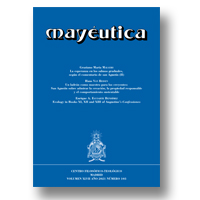|
2.
|
Mayéutica:
Volume >
48 >
Issue: 106
Victor R. Ribeiro de Lima
Liberdade e mal em Santo Agostinho
abstract |
view |
rights & permissions
| cited by
This paper expresses the principles of free will in the thought of the philosopher and bishop of Hippo, St. Augustine, in order to establish the understanding that there is about freedom and evil, since every human creature seeks to be free and good. In order to interpret the concepts of free will and the origin of evil, we will take into consideration these works of Saint Augustine: De libero arbitrio, Confessiones, and De ciuitate Dei; what is presented in the three books about whether sin comes from free will and whether the proof of God’s existence reveals him as the source of all good. In addition to the use of some commentators. In reviewing the texts one can affirm that God is not the author of evil, but the misuse of free will which in itself is a good, and praise God for the universal order, of which free will is a positive component, even if subject to sin. For Augustine, true happiness is found in accepting the Grace of God. The ability to choose, that is, free will, is not free until then. Freedom consists in having the will to return to the good. Free will conditions us to follow God’s will or not. However, only the one who chooses to carry out God’s will with God’s help will be free.
|
|
|
3.
|
Mayéutica:
Volume >
48 >
Issue: 106
Abrahám A. Montoya Brito
El paralítico de la piscina de Betesda. Aproximación exegética a Jn 5, 1-18
abstract |
view |
rights & permissions
| cited by
The article deals with the text of Jn 5:1-18, first of all highlighting the contextual elements of the Gospel text, and then presenting the connotative elements of the text itself, as well as the different interpretations that some contemporary specialists make of the text. At the end, some conclusions are offered, as well as the author’s personal reading of the text of Jn 5: 1-18.
|
|
|
4.
|
Mayéutica:
Volume >
48 >
Issue: 106
Enrique A. Eguiarte Bendímez
La máscara y el espejo. Aspectos teatrales de la obra narrativa de Elena Garro (I)
abstract |
view |
rights & permissions
| cited by
The article deals with the narrative and theatrical work of Elena Garro, in order to present, firstly, an extensive biography of the Mexican writer, in view of the fact that the existing biographies are very partial and omit many essential facts about her life. Secondly, a thematic and semiotic analysis is made of her novels and short stories as well as her theatre. Finally, some conclusions are offered.
|
|

